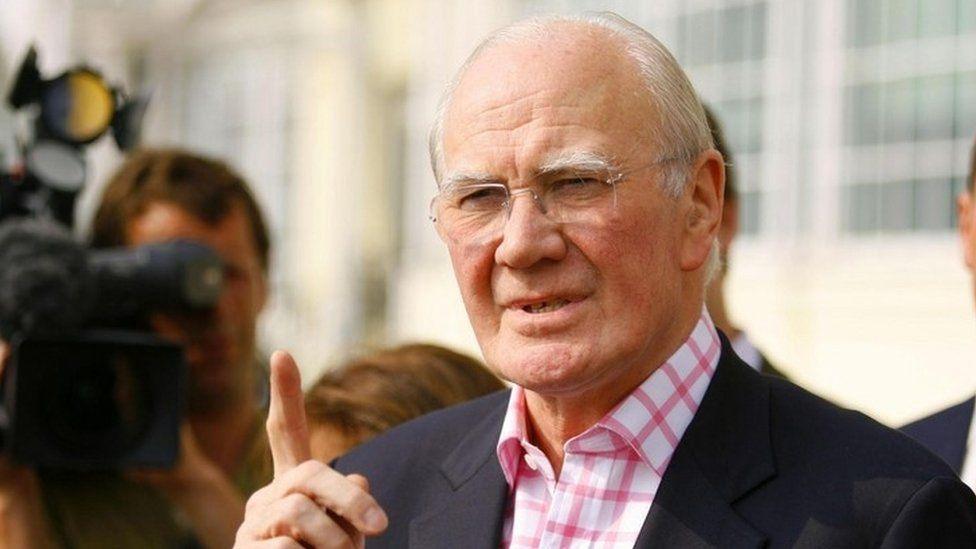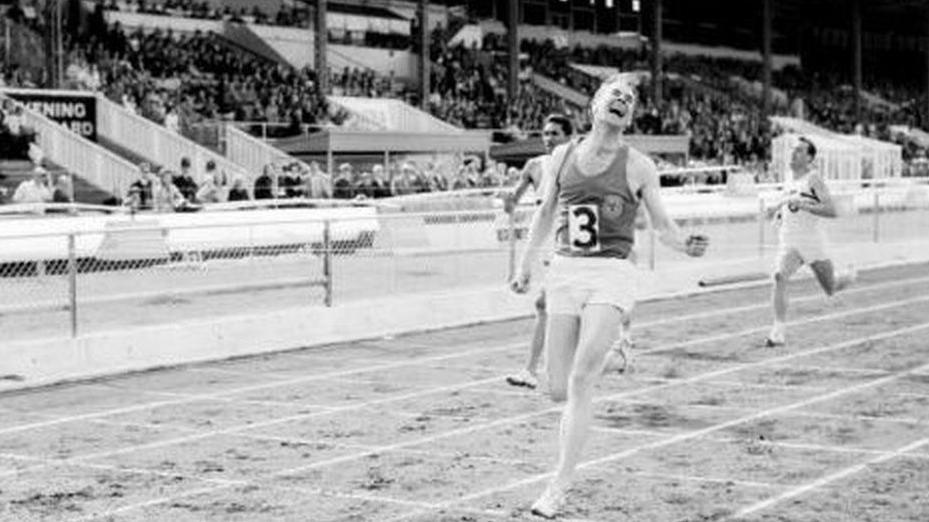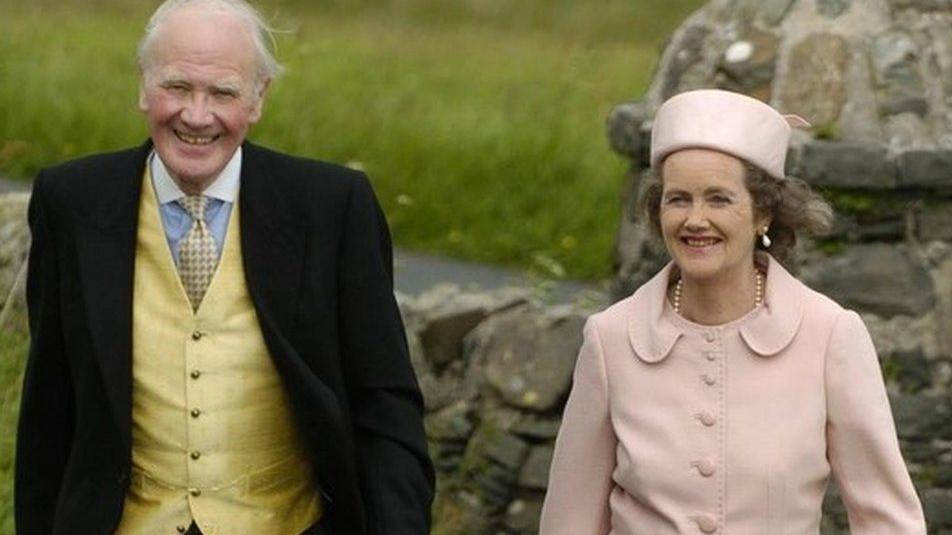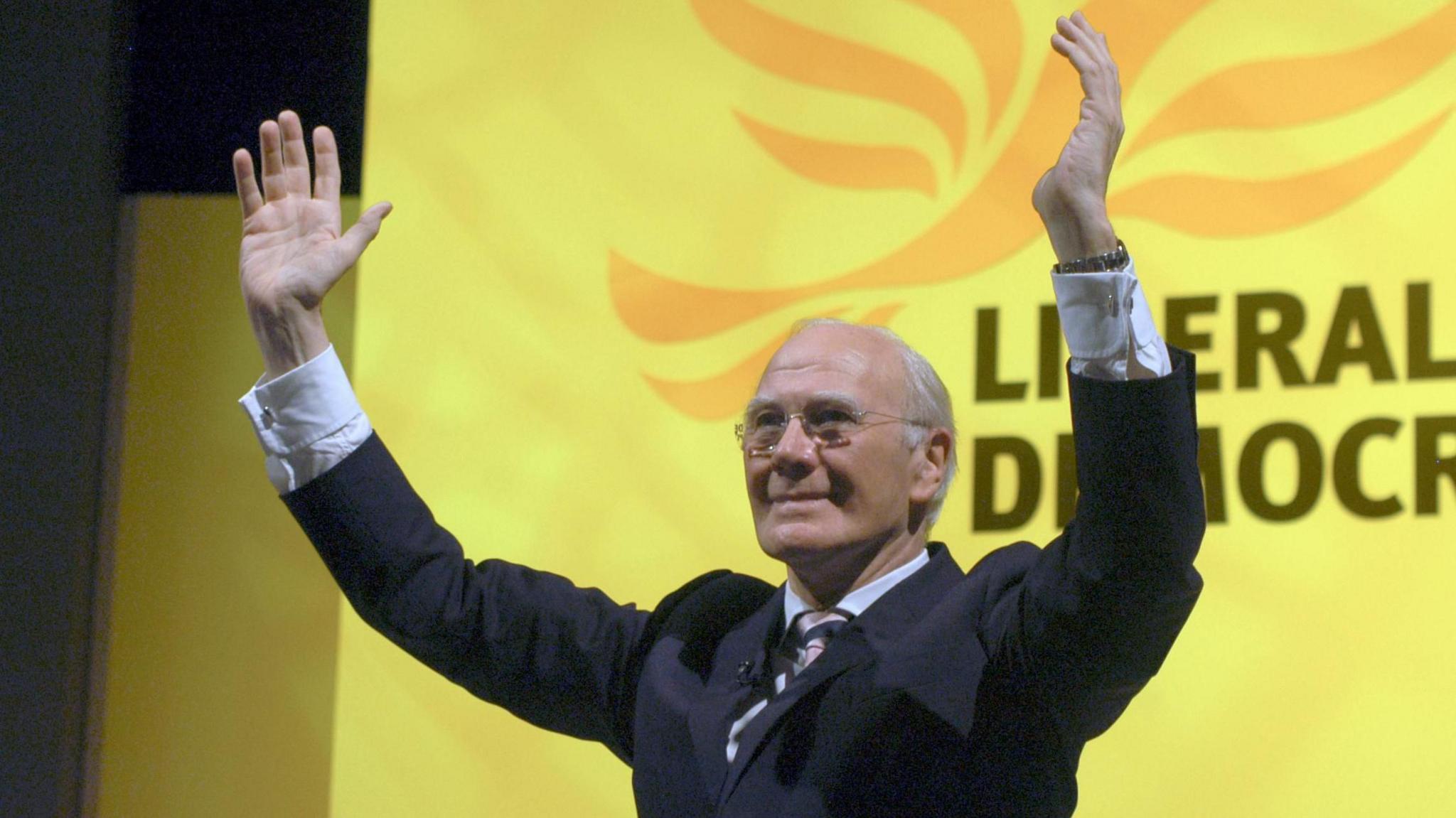Menzies Campbell: Athlete, lawyer and formidable politician

Lord Campbell was Liberal Democrat leader from 2006 to 2007
- Published
Menzies Campbell, latterly Lord Campbell of Pittenweem but usually known as Ming, was one of Westminster's most distinctive and authoritative voices.
A Scottish MP, he was most associated with foreign affairs. Never more so than when challenging the legality of military action against Iraq.
He struggled to get elected to parliament and, by the time he arrived in Westminster in 1987 aged 46, he was competing with a younger generation of politicians.
He would go on to have a brief spell as Liberal Democrat leader almost 20 years later.
The former Olympic athlete, who has died at the age of 84, had an urbane manner and "grandee" style, although it belied more humble origins.
He was born Walter Menzies Campbell on 22 May 1941 and was brought up in a Glasgow tenement.
His father was a joiner and, though he rose to become general manager of the city's building department, the family stayed in the same Kelvinbridge flat.
Campbell was a sports-obsessed youngster at Hillhead High School and showed an early talent for running.
At Glasgow University, where he studied law, he became life-long friends with two future Labour stars - John Smith and Donald Dewar.
He also began breaking Scottish records for the 100 and 200 yard sprints.

The young Ming Campbell was Britain's fastest sprinter
Inevitably dubbed "The Flying Scotsman", he represented Great Britain at the 1964 Tokyo Olympics.
Though he failed to win a medal, he went on to captain the British men's team at the 1966 Commonwealth Games in Jamaica.
A year later, he set a new British 100m record of 10.2 seconds - beating a young OJ Simpson in the process. The record stood until 1972.
He attended Stanford University in California during the Vietnam War. It was a life-changing experience for the sheltered young man from Glasgow.
"It was a watershed in my life because it made me realise there was a world outside Byres Road," he once said, referring to the street at the heart of the city's West End.
Campbell became an advocate, was called to the Scottish bar in 1968 and made a QC (latterly KC) in 1982. The law gave him a lucrative career and he continued to practise throughout his time in politics.
A Liberal since his teens, he had unsuccessfully fought four parliamentary seats in Scotland before eventually winning North East Fife in 1987. Within a year, he was appointed spokesman on defence for the newly-formed Liberal Democrats.
He would speak for the party on defence and foreign affairs for the next 18 years.
'Constant political companion'
His wife Elspeth was, in his own description, his "constant political companion".
They married within weeks of meeting in 1970 and he became step-father to her son James, who was at the time heir to the Grant-Suttie Baronetcy of Balgone in East Lothian, a role he later inherited.
Elspeth was the daughter of Maj Gen Roy Urquhart, who commanded the British Airborne Division at Arnhem in 1944 and was portrayed by Sir Sean Connery in the 1977 film A Bridge Too Far.
Together, the Campbells were mainstays of the Edinburgh political scene. This kept Menzies close to his university friend, the future Labour leader John Smith, who repeatedly tried to persuade him to switch parties.
That he did not defect undoubtedly delayed his election to Westminster but, once there, he became a star of both his party and the parliament.
He was a prominent critic of US nuclear policy and a long-serving member of the UK's delegation to the North Atlantic Assembly, the diplomatic arm of Nato.
Before the 1997 election, the Labour leader, Tony Blair, had made an agreement with his Lib Dem counterpart, Paddy Ashdown, that in the event of a hung parliament a deal would be done for Lib Dems to enter a Labour-led cabinet.

The Campbells were popular at society events in Scotland
Campbell would almost certainly have been one of those ministers but, in the event, the Labour landslide rendered the agreement moot.
When Ashdown stepped down as party leader in 1999, Campbell was the early favourite to succeed him but pulled out of the race after taking soundings from colleagues and friends.
However, he continued to impress as foreign affairs spokesman, articulating the party's opposition to the US-led invasion of Iraq in 2003 and misgivings over the Blair government's close relationship with Washington.
Campbell later described his opposition to the war as "the most significant political thing I've been engaged with".
The previous year he had been diagnosed with non-Hodgkin's Lymphoma but continued to work while undergoing chemotherapy and made a full recovery.
Lib Dem party leader
Campbell's chance to lead came again in 2006, when Charles Kennedy resigned as Lib Dem leader after admitting to a drinking problem.
This time Campbell won the top job. But it was a short-lived period at the helm.
A diplomat by nature and possessed of old-fashioned manners, he struggled as a party leader and his performances in the bear pit of Prime Minister's Questions were seen by many as ineffectual.
Despite promoting younger colleagues to the Lib Dem front-bench he was, at 66, often portrayed as being too old for the job.

His time as Liberal Democrat leader was short
When Gordon Brown became prime minister in 2007, he promised a new straightforward style in place of Blairite spin. Support for Labour revived and the Lib Dems struggled.
There was widespread expectation that Brown would call a general election in October 2007 to consolidate his position, which would have given Campbell the opportunity to lead a Lib Dem campaign.
But Brown hesitated and the moment was lost. The pressure on Campbell increased and it was announced he would stand down as leader after just 19 months. He was succeeded by Nick Clegg.
Campbell came under fire when the Daily Telegraph published details of MPs' expenses in 2009. It discovered that he had claimed £10,000 to renovate his London flat.
He said he believed that his claims were "within the spirit and letter of the rules".

Lord Campbell continued to campaign for colleagues at the Scottish Parliament
Campbell left the Commons in 2015 and went to the Lords as Baron Campbell of Pittenweem. His constituency of North East Fife fell to the SNP landslide in Scotland.
Always immaculately dressed - he once admitted that Elspeth picked his shirts - Lord Campbell remained a popular and respected parliamentarian, speaking for the Lib Dems on defence in the Lords.
When Lady Elspeth died in 2023 he said: "After more than 50 years of marriage, my bright, beautiful and witty Elspeth has gone.
"She was my constant political companion, always my encouragement and forever my first line of defence."
He always regretted that his tenure as leader was so short.
"Under my leadership, the Liberal Democrats would not be making polite interjections from the sidelines," he once said.
"We would be hammering on the doors of power."